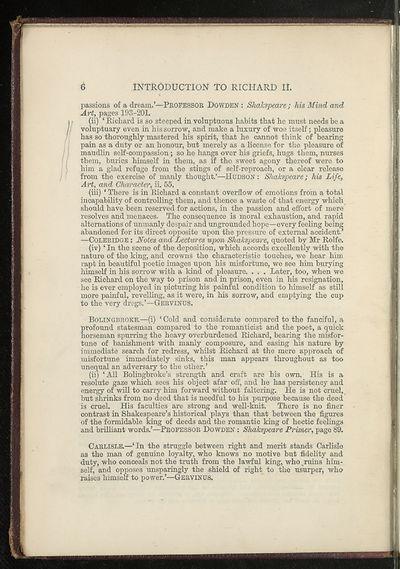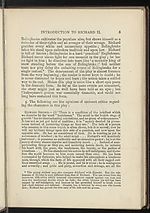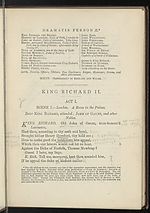Download files
Complete book:
Individual page:
Thumbnail gallery: Grid view | List view

6
INTRODUCTION TO RICHARD II.
passions of a dream.’—PROFESSOR Dowden : Shakspeare; his Mind and
Art, pages 193-201.
. (ii) ‘ Richard is so steeped in voluptuous habits that he must needs be a
has so thoroughly mastered his spirit, that he cannot think of bearing
pain as a duty or an honour, but merely as a license for the pleasure of
maudlin self-compassion; so he hangs over his griefs, hugs them, nurses
from the exercise of manly thought.’—Hudson: Shakspeare; his Life,
Art, and Character, ii. 55.
(hi) ‘ There is in Richard a constant overflow of emotions from a total
incapability of controlling them, and thence a waste of that energy which
should have been reserved for actions, in the passion and effort of mere
resolves and menaces. The consequence is moral exhaustion, and rapid
alternations of unmanly despair and ungrounded hope—every feeling being
abandoned for its direct opposite upon the pressure of external accident.’
—Coleridge : Notes and Lectures upon Shakspeare, quoted by Mr Rolfe.
(iv) ‘ In the scene of the deposition, which accords excellently with the
nature of the king, and crowns the characteristic touches, we hear him
rapt in beautiful poetic images upon his misfortune, we see him burying
himself in his sorrow with a kind of pleasure. . . . Later, too, when we
see Richard on the way to prison and in prison, even in his resignation,
he is ever employed in picturing his painful condition to himself as still
more painful, revelling, as it were, in his sorrow, and emptying the cup
to the very dregs.’—Gervinus.
Bolingbroke.—(i) ‘ Cold and considerate compared to the fanciful, a
profound statesman compared to the romanticist and the poet, a quick
horseman spurring the heavy overburdened Richard, bearing the misfor¬
tune of banishment with manly composure, and easing his nature by
immediate search for redress, whilst Richard at the mere approach of
misfortune immediately sinks, this man appears throughout as too
unequal an adversary to the other.’
(ii) ‘All Bolingbroke’s strength and craft are his own. His is a
resolute gaze which sees his object afar off', and he has persistency and
energy of will to carry him forward without faltering. He is not cruel,
Kn-f. cVvrinlra ■frmn rm is npprlfnl Vila tyiiTr»r»ap Kppqiicp flip /^pp/1
voluptuary even in his sorrow, and make a luxury of woe itself; pleasure
them, buries himself in them, as if tho sweet agony thereof were to
him a glad refuge from the stings of self-reproach, or a clear release
INTRODUCTION TO RICHARD II.
passions of a dream.’—PROFESSOR Dowden : Shakspeare; his Mind and
Art, pages 193-201.
. (ii) ‘ Richard is so steeped in voluptuous habits that he must needs be a
has so thoroughly mastered his spirit, that he cannot think of bearing
pain as a duty or an honour, but merely as a license for the pleasure of
maudlin self-compassion; so he hangs over his griefs, hugs them, nurses
from the exercise of manly thought.’—Hudson: Shakspeare; his Life,
Art, and Character, ii. 55.
(hi) ‘ There is in Richard a constant overflow of emotions from a total
incapability of controlling them, and thence a waste of that energy which
should have been reserved for actions, in the passion and effort of mere
resolves and menaces. The consequence is moral exhaustion, and rapid
alternations of unmanly despair and ungrounded hope—every feeling being
abandoned for its direct opposite upon the pressure of external accident.’
—Coleridge : Notes and Lectures upon Shakspeare, quoted by Mr Rolfe.
(iv) ‘ In the scene of the deposition, which accords excellently with the
nature of the king, and crowns the characteristic touches, we hear him
rapt in beautiful poetic images upon his misfortune, we see him burying
himself in his sorrow with a kind of pleasure. . . . Later, too, when we
see Richard on the way to prison and in prison, even in his resignation,
he is ever employed in picturing his painful condition to himself as still
more painful, revelling, as it were, in his sorrow, and emptying the cup
to the very dregs.’—Gervinus.
Bolingbroke.—(i) ‘ Cold and considerate compared to the fanciful, a
profound statesman compared to the romanticist and the poet, a quick
horseman spurring the heavy overburdened Richard, bearing the misfor¬
tune of banishment with manly composure, and easing his nature by
immediate search for redress, whilst Richard at the mere approach of
misfortune immediately sinks, this man appears throughout as too
unequal an adversary to the other.’
(ii) ‘All Bolingbroke’s strength and craft are his own. His is a
resolute gaze which sees his object afar off', and he has persistency and
energy of will to carry him forward without faltering. He is not cruel,
Kn-f. cVvrinlra ■frmn rm is npprlfnl Vila tyiiTr»r»ap Kppqiicp flip /^pp/1
voluptuary even in his sorrow, and make a luxury of woe itself; pleasure
them, buries himself in them, as if tho sweet agony thereof were to
him a glad refuge from the stings of self-reproach, or a clear release
Set display mode to:
![]() Universal Viewer |
Universal Viewer | ![]() Mirador |
Large image | Transcription
Mirador |
Large image | Transcription
| Antiquarian books of Scotland > Languages & literature > Shakespeare's Richard II > (8) |
|---|
| Permanent URL | https://digital.nls.uk/109384966 |
|---|
| Description | Thousands of printed books from the Antiquarian Books of Scotland collection which dates from 1641 to the 1980s. The collection consists of 14,800 books which were published in Scotland or have a Scottish connection, e.g. through the author, printer or owner. Subjects covered include sport, education, diseases, adventure, occupations, Jacobites, politics and religion. Among the 29 languages represented are English, Gaelic, Italian, French, Russian and Swedish. |
|---|

